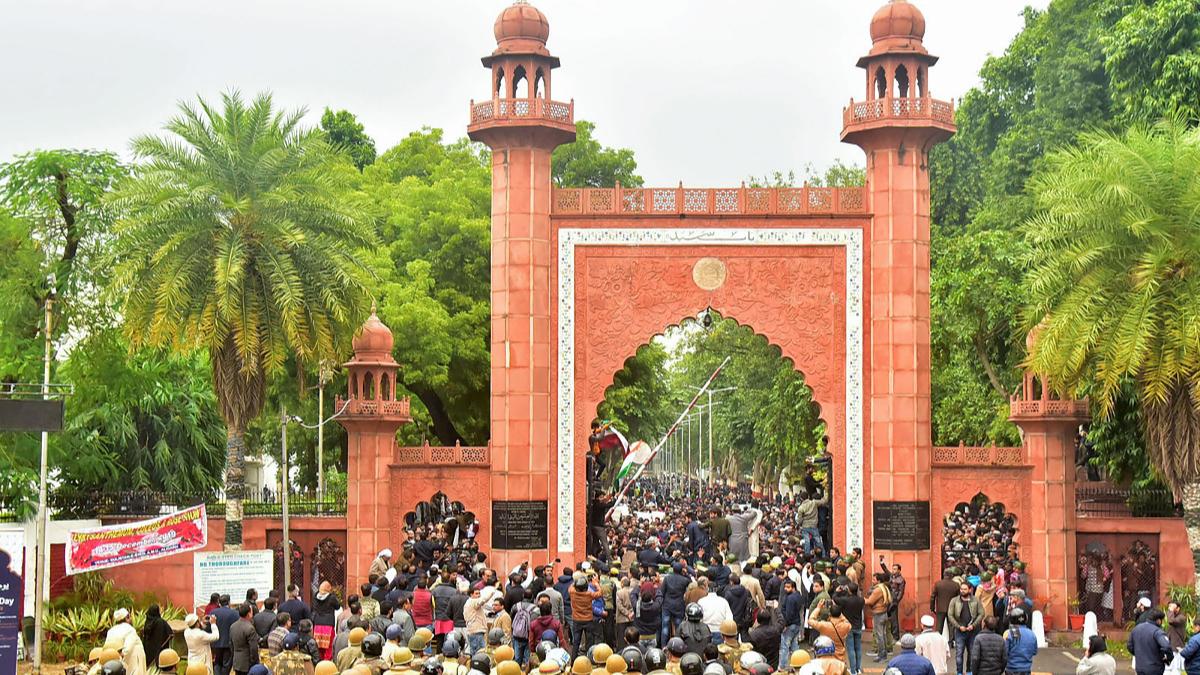
Muhammad Ali Jinnah may only be remembered as the man who gave the scar of partition to India, but Indian politicians never forget to bring him during the elections. With India’s five states going closer to the assembly elections, the Jinnah debate is yet again taking centre stage. The war of words has escalated between the Opposition and the ruling Bharatiya Janata Party (BJP) in Uttar Pradesh over Jinnah.
Known as the Mecca of education, the Aligarh Muslim University (AMU) in western Uttar Pradesh has its own iconic historical legacy. Aligarh has witnessed controversy around Muhammad Ali Jinnah, whose portrait is still located in the union hall of Aligarh Muslim University.
JINNAH DEBATE: SATISH GAUTAM TO AKHILESH YADAV
The controversy first erupted in 2018, when BJP’s Lok Sabha member Satish Gautam objected to Jinnah’s portrait in AMU’s union hall along with the other freedom fighters. Why should the AMU keep a photograph of the man who partitioned India, asked Gautam.
The Jinnah debate has not settled in Aligarh since then. Recently, it was stirred afresh by Samajwadi Party president Akhilesh Yadav. On October 31, he said Jinnah studied at the same institute as Mahatma Gandhi and Jawaharlal Nehru and fought for India’s freedom alongside these leaders.
Akhilesh Yadav’s remark drew sharp criticism from the BJP with Uttar Pradesh Chief Minister Yogi Adityanath calling it a “shameful statement”. Yogi Adityanath said people rejected such politics.
On November 12, Akhilesh Yadav’s new ally Suheldev Bhartiya Samaj Party leader Om Prakash Rajbhar praised Jinnah. Rajbhar claimed that had Jinnah been India’s prime minister after Independence, the country would not have been partitioned.
BJP leader and Union minister Anurag Thakur promptly countered Rajbhar, saying that Jinnah politics was being done for appeasement. Several BJP leaders have referred to the Jinnah debate in their election speeches in Uttar Pradesh since then.
WHAT AMU THINKS
India Today TV team visited the AMU campus to get a sense of the political temperature the Jinnah debate was generating ahead of the Uttar Pradesh polls. The university has students from different parts of India as well as from other countries.
Salma, a Theology department student who is studying and researching Hindi writers and literature, said she admired Adi Guru Shankaracharya for his idea on communal harmony. The theology department of the AMU imparts teaching not only in Islam but other religions such as Hinduism, Sikhism and Buddhism.
The head of the Theology department, Professor Mufti Zahid Ali Khan, said the controversy about Jinnah was totally political as his photograph kept in the union hall was from pre-Independence.
Professor Zahid said Jinnah’s portrait was also in the Parliament building and the Mumbai High Court. He said it was kept at the university to show honorary membership.
Professor Mufti Zahid said it was India and Indian Muslims who suffered because of Jinnah. He said the Muslims should have rejected Jinnah long back.
‘BJP TO BLAME’
Professor Zahid said it was the Sangh Parivar and the BJP who benefited from Jinnah’s politics and they still raked up the issue often. He said Jinnah was responsible for the Partition scar which destroyed the future of Indian Muslims.
Umar Qadri, a student, said the AMU had no political outfit in its student politics but there were students of all ideologies openly sharing their ideas and without fear. Qadri said Jinnah was only the BJP’s political issue.
Farhan Zubairi, an AMU student, said the smooth functioning of the university was a bigger issue for the students than the Jinnah debate. His views were echoed by Imran Khan who said scholarship should be made regular and the number of seats for research scholars increased at the AMU.
[“source=indiatoday”]





